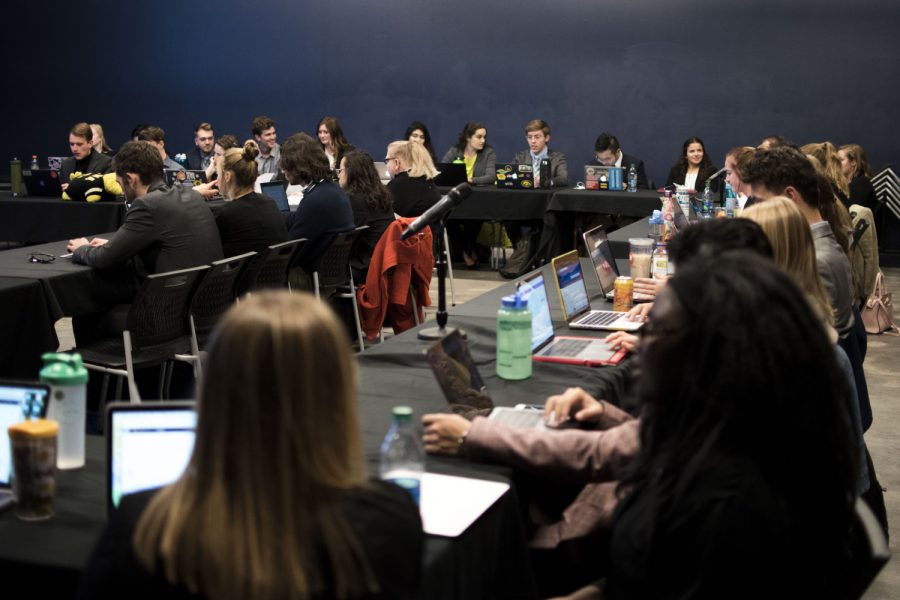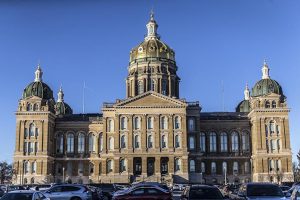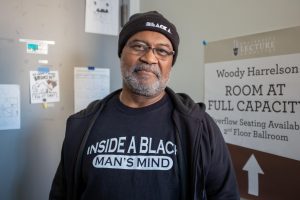Demographics Assessment Team offers recommendations for representation in UISG
UISG’s Demographic Assessment Team released a report providing data about the organization’s representation efforts.
Members of the UISG meet in the Black Box Theater on Tuesday, October 23, 2018.
January 23, 2019
“Every student has the right to be represented by a democratic student government,” Section 8 of the Student Bill of Rights states.
Demographics Assessment Team lead Tristan Schmidt kept this statement in mind when he brought up the idea for a first-ever survey measuring demographics in University of Iowa Student Government.
The goal of the survey is to be a “catalyst in addressing the goal of representation and asking the question: How representative is UISG?” according to the executive statement and purpose.
The survey reported that UISG has lopsided representation among the university’s colleges as well as ideologies.
The Demographics Assessment Team — UISG members Carolina Herrera, Alexia Sanchez, and Herbert Meisner — also provided recommendations in response to the survey results. The recommendations are intended for UISG to recognize areas of overrepresentation or underrepresentation.
The recommendations compiled by the team suggested using a college-apportionment ticket system instead of an open-ticket system to increase inclusion of all undergraduate colleges. However, the recommended changes are still discussions, and the open-ticket system will remain.
“The overrepresentation and underrepresentation of certain colleges impedes academic diversity and thought, which has bearing on UISG processes,” Schmidt said.
RELATED: UISG votes for additional funding towards Hawkeye Completion Grant Program
The report also showed that UISG lacks ideological representation. Schmidt said UISG has historically shown a skew toward more liberal or liberal-moderate ideology. The survey results for political ideology reveals that 42.47 percent of members identify as liberal and 38.36 percent identify as liberal-moderate; 5.48 percent are moderate-conservative, and 2.74 percent are conservative.
“This trend can be interpreted in a number of ways, but UISG [data] provide that this possibly prevents ideological diversity and may require the application process for UISG members be audited by external parties such as the Office of the Vice President for Student Life,” Schmidt said.
UISG hopes to implement the recommendations to further its inclusion efforts and align itself with the diversity, equity, and inclusion efforts made by the university.
“I believe if we are not analyzing our representation regarding identities, ideologies, backgrounds, and disciplines, we are doing the University of Iowa students a disservice,” Meisner said.
RELATED: UISG to pair with Yellow Cab to provide airport shuttle service
The idea for a demographics survey originated with the 2017-18 UISG administration, Schmidt said.
“It allows for the organization to see what we are missing and what we need to work on regarding representation,” Herrera said. “It leads us to create a more diverse environment that better represents our students, which is very important in an institution that strives to be more diverse and inclusive.”
The report was constructed via a survey sent out to the all three branches of UISG. It consisted of three different sections: UISG and Campus Profile, Academic Profile, and Identity Profile.
The survey was conducted and offers data from the fall semester. This is the first time UISG has constructed a demographics assessment in any capacity. It will conduct another assessment during the spring to identify patterns in areas with over or underrepresentation.
“The data also provide UISG with a better understanding of trends and patterns in member composition and makeup in areas such as ideological affiliation, first-generation status, and more that can indirectly affect student legislative, executive, and judicial processes,” Schmidt said.






